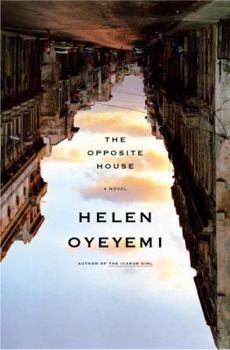The Opposite House
Select Format
Select Condition 
Book Overview
Lyrical and intensely moving, The Opposite House explores the thin wall between myth and reality through the alternating tales of two young women. Growing up in London, Maja, a singer, always... This description may be from another edition of this product.
Format:Hardcover
Language:English
ISBN:0385513844
ISBN13:9780385513845
Release Date:June 2007
Publisher:Nan A. Talese
Length:257 Pages
Weight:1.05 lbs.
Dimensions:0.8" x 6.1" x 8.4"
Customer Reviews
2 ratings
This books gives you a lot to think about
Published by Thriftbooks.com User , 16 years ago
Helen Oyeyemi is a young woman of Nigerian descent who has lived in London since 1988, when she was four years old. Being a black immigrant in Great Britain seems to have had a direct influence on this book, The Opposite House. This is an unusual book and not a story that is easy to get into. Oyeyemi writes in a sumptuous poetic style that is filled with metaphors and color. An example of that style comes from page 51 of this edition, "Cars thread past the traffic lights like an outpour of lost buttons." This descriptive style is both rich and confusing in that the metaphors frequently took me away from the flow of the story. The novel is mainly about Maja, an Afro-Cuban girl who emigrated from Cuba to England when her father began to feel that Castro's government was not going to let him live the life they desired. Like Oyeyemi, Maja was four when she arrived in London and as the plot unfolds she has only a few confused memories of Cuba. In school this is an issue because she is the descendent of slaves brought to Cuba-so her heritage is African, but she has never been there at all. This causes her to struggle with her identity and confuses her ideas of where her life should be going. Her best friend is from Trinidad and her boyfriend is a white Ghanaian. Adding to this somewhat convoluted racial plot is a subplot of magical realism - a somewherehouse with doors to London and Lagos. There are characters there that seem to reflect some aspect of Maja's feelings. These sections are reminiscent of the works of Gabriel Garcia-Marquez and Toni Morrison. This is a book that is definitely not light reading, but could make for an interesting discussion piece in the right class or book group. Armchair Interviews agrees.
A Novel of Yearning for Home
Published by Thriftbooks.com User , 17 years ago
From The Opposite House by Helen Oyeyemi: "I need my Cuba memory back, or something just as small, just as rich, to replace it, more food for my son, for me. I think I will pretend that I am not from Cuba and neither is my son. The boy and I started a race from that other country, and I got here first." The Opposite House reads like a book written by the love child of Virginia Woolf and Gabriel Garcia Marquez, assuming either had been from Cuba. It's a story filled with yearning for a native country, or for the memory of a native country, despite the fact the main character, Maja Carmen Carrera, only has one memory left of her childhood. Twenty years later she's pregnant with her boyfriend Aaron's baby, and living in London. Still, that one memory goes along with her, haunting her dreams. The book is shot through with so much internal conflict the pain is often palpable, and sometimes raw. An African Cuban, she doesn't feel she fully belongs in either the world with her memory of Cuba or in an England that doesn't completely feel like home, either: "I was seven years old when we came here. I've come to think that there's an age beyond which it is impossible to lift a child from the pervading marinade of an original country, pat them down with a paper napkin and then deep-fry them in another country, another language like hot oil scalding the first language away. I arrived here just before that age." It's the lushness of the language, though, that's the dominating factor in what makes this such a wonderful book. The sensuous language is woven throughout: "The day was hot but gentle; beneath its healing steam lay granite, decrepit wood, rocks gloved in blanched sand. The harbour water caught sunlight in layered hoops of petrol-coloured dirt and tried to keep its clarity secret, but the divers told. Small, earth-brown boys kept bobbing up, their backbones hacking out of their skin, hair plastered to their heads, coin pouches around their waists rattling as they added new handfuls of slick bronze to their store." The Opposite House is told in alternating narrative, flashing between Maja's story and the fantastical, alternate reality of a girl named Yemaya, whose connection with Maja really is never completely spelled out. Rather, it's a more spiritual connection, a reaching across the dimensions between two souls who don't feel fully at home, or at ease, and whose searchings lead them almost to each other, in a sort of alternate reality that lies between them. It has a lot to do with feeling alien, never able to feel you fit into a culture, but not able to go back, either, because that door has closed. It's this door, between the two worlds, that seems to be Oyeyemi's target, this ethereal, intangible "door" that won't open for either Maja or Yemaya, and it's this reality that frustrates the both of them. Yet, neither can forget the past, and they carry the weight of it with them while trying to make their lives elsewhere. They are a part of s






